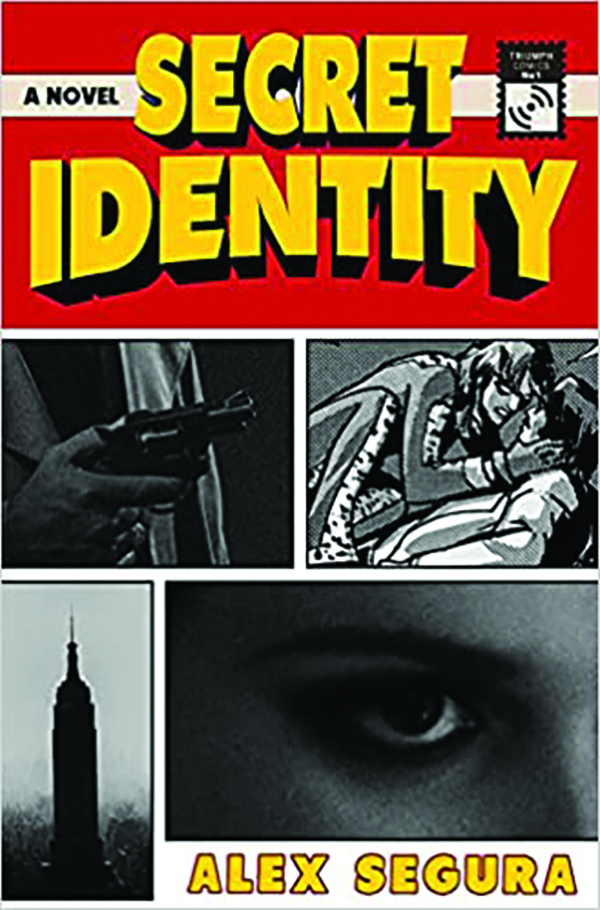About once a month, a package of comic books arrives in my mailbox from my father. We’ve been reading comics together ever since The Death of Superman, the media-hyped story from 1992 in which the iconic hero perished in an all-out battle against the monster Doomsday. (He got better.) The comic sold more than 6 million copies, one of them to us. That event ignited a love of comics in 10-year-olds like me and reintroduced it to adults like my father, who hadn’t purchased a superhero comic since his own teenage years. Our local comic shop reaps the rewards to this day.

It’s better that we talk comics than politics. He a Texas conservative and me a Portland neoliberal, DC Comics is a less divisive topic of conversation than D.C. politics. Superheroes remain a common touchstone for both of us, a reliable bridge between our cultural differences. I thought of this often while reading Secret Identity, a new noirish mystery novel from author and comic book writer Alex Segura.
Secret Identity tells the story of Carmen Valdez, a young Cuban American introduced to comics via her father, who inculcates a love for the medium through ritual trips to the neighborhood pharmacy to browse the spinner racks and pick a few issues to bring home. An immigrant to Miami from Cuba, he tells Carmen of learning to read English from superhero stories. After this brief glimpse of her childhood, the novel finds Carmen in 1970s New York City, now an aspiring comic book writer herself and estranged from her more conservative family members after they discover she’d been dating a woman.
Carmen lands a job as a secretary at Triumph Comics, a third-rate publisher struggling behind juggernauts DC and Marvel. It’s a foot in the door, but despite her obvious passion for comics, any hints at moving into the creative side of the business are stymied by her old-fashioned boss, who views comic book writing as a men’s realm. Enter Harvey Stern, a middling editor at Triumph looking for his own big break, who approaches Carmen with a proposal: create a superhero together with only his name on the credits and wait to reveal Carmen’s contribution until after it hits print.
The plan begins successfully when their hero, a female urban vigilante named the Lethal Lynx, debuts and shoots to the top-selling slot in Triumph’s slate of titles. But things go tragically wrong when Carmen finds Harvey dead with a bullet through his skull. This sets in motion the central plot of Secret Identity, as Carmen races to solve the mystery of who killed her collaborator, prove her role as co-creator of the Lynx and regain control of the character, and survive becoming a target herself.
The novel is complemented by interspersed pages from the fictional Lynx comic book, drawn in real life by Sandy Jarrell but presented as artifacts in the world of Secret Identity, with character beats and illustration styles varying with the creative teams taking control of the character. It’s a fun addition that adds to the immersiveness of the story.
Secret Identity is firmly in the mold of a murder mystery, complete with a suddenly returned ex-lover with dubious motivations, a no-nonsense detective working the case parallel to Carmen, and additional deaths piling up as the story careens toward resolution. The book is a love letter to comics, replete with allusions to classic issues, such as artist Carmine Infantino’s 1966 Flash cover in which the hero breaks the fourth wall to implore readers to buy the comic. At other times, the superhero connection arrives as a metaphor, as in when a budding romance is described as “a seismic shift in how things needed to be — like Kang the Conqueror spiraling back in time to prevent the Avengers from being born.” The allusions are not overdone, but one’s enjoyment of the novel will be at least somewhat proportional to whether these occasional references land. (Kang was a deep cut even for me.)
Fans of comics will also see in the plot familiar notes from the history of the medium: the fight for creators to retain control of and credit for their characters, as well as the ways in which superheroes represent the empowered fantasies of the men who created them. There are parallels here to Jack Kirby, Bill Finger, and Jerry Siegel and Joe Shuster, all sons of Jewish immigrants and all of whom were long denied proper recognition for their roles in creating enduring characters such as the Fantastic Four, Batman, and Superman. And in the same way that Superman stood in as a powerful male fantasy for the nebbish young men who wrote him, one can imagine the effortlessly strong and capable Lynx springing forth from a creatively frustrated woman writer struggling to break into a male-dominated business.
While the murder mystery of the book is plenty engaging, the resolution of the whodunnit is less important than Segura’s re-imagining of comic creation through the experience of a young Cuban American woman in the gritty New York City of the 1970s. And though real-life drama in the comics business didn’t rise to the level of murder, it’s apt that in a story like this one it does. For what is the role of superheroes if not to play out our normal human conflicts with higher stakes and at grander scale, envisioning the possibility of becoming our best selves? Set decades before the box-office dominance of Batman and the Avengers, when comic publishers struggled to survive by catering to children and misfits, Secret Identity is both an intriguing mystery and a fun exploration of why these characters enduringly appeal.
Jacob Grier is the author of The Rediscovery of Tobacco: Smoking, Vaping, and the Creative Destruction of the Cigarette.
